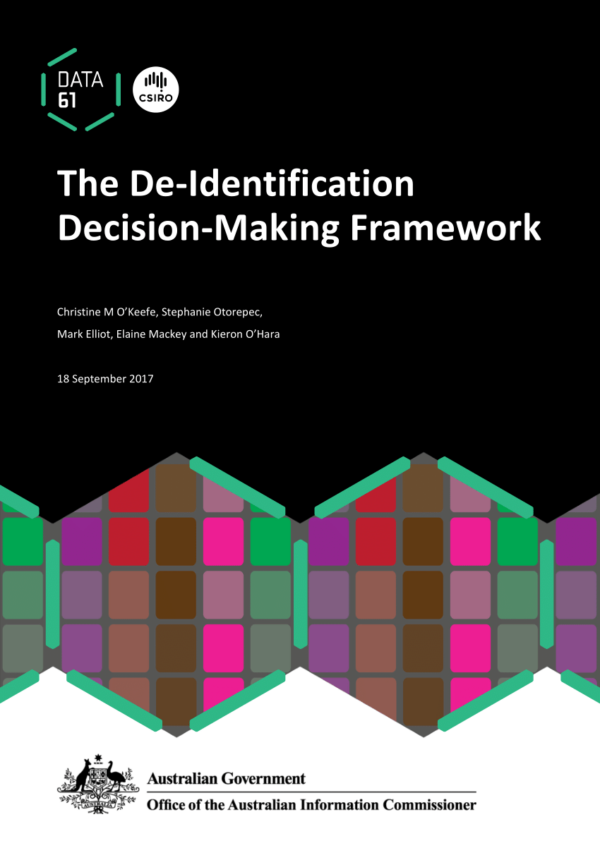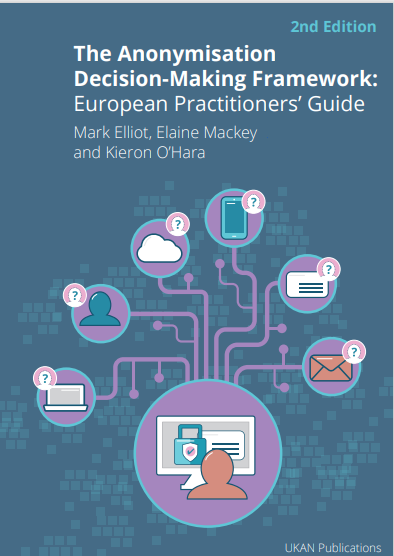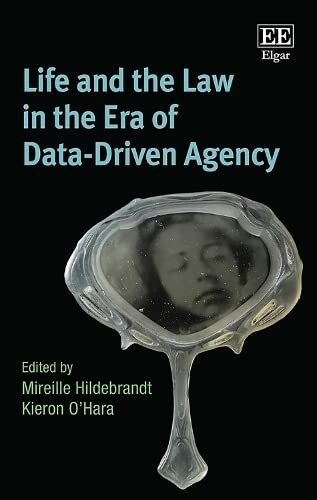Privacy
 Books relating to Privacy
Books relating to Privacy
Dictionary of Privacy, Data Protection and Information Security

The Dictionary of Privacy, Data Protection and Information Security explains the complex technical terms, legal concepts, privacy management techniques, conceptual matters and vocabulary that inform public debate about privacy.
Interdisciplinary in scope, this Dictionary is invaluable to students, scholars and researchers in law, technology and computing, cybersecurity, sociology, public policy and administration, and regulation. It is also a vital reference for diverse practitioners including data scientists, lawyers, policymakers and regulators.
The De-Identification Decision-Making Framework

The De-Identification Decision-Making Framework is an adaptation to the Australian context of the
UK resource The Anonymisation Decision-Making Framework, and is the result of a close
collaboration of CSIRO and the Office of the Australian Information Commissioner, with input from
the Australian Bureau of Statistics and the Australian Institute of Health and Welfare. The
adaptation has required revisions due to differences in the legal frameworks, the use of Australian
examples and terminology, and minimal additional changes.
The Anonymisation Decision-Making Framework

The ADF provides a way of thinking about anonymisation and the reuse of personal data that breaks out of the constraints of overly technical or overly legal framings of the problem. Effectively anonymising data whilst still remaining compliant with GDPR is possible, given a suitable framework and set of tools. GDPR is intended to facilitate proper and appropriate data sharing and reuse as well as protecting data subjects. The ADF provides a mechanism for realising both of these ambitions.
The Spy in the Coffee Machine

We are entering a new state of global hypersurveillance. As we increasingly resort to technology for our work and play, our electronic activity leaves behind digital footprints that can be used to track our movements. In our cars, telephones, even our coffee machines, tiny computers communicating wirelessly via the Internet can serve as miniature witnesses, forming powerful networks whose emergent behaviour can be very complex, intelligent, and invasive. The question is: how much of an infringement on privacy are they? Exposing the invasion of our privacy from CCTVs to blogs, The Spy in the Coffee Machine explores what—if anything—we can do to prevent it from disappearing forever in the digital age, and provides readers with a much needed wake-up call to the benefits and dangers of this new technology.
Life and the Law in the Era of Data-Driven Agency

This ground-breaking and timely book explores how big data, artificial intelligence and algorithms are creating new types of agency, and the impact that this is having on our lives and the rule of law. Addressing the issues in a thoughtful, cross-disciplinary manner, leading scholars in law, philosophy, computer science and politics examine the ways in which data-driven agency is transforming democratic practices and the meaning of individual choice.
The Seven Veils of Privacy

In this book, Kieron O’Hara reveals that much of the conflict around privacy results from taking different perspectives that veil key assumptions and disguise points of agreement. Focusing on the seven most important of these perspectives, he offers a framework for negotiating this important but complex topic.
Expertly blending insights from philosophy, history, sociology, law, computing and politics, and with plenty of real-world examples, O’Hara’s The Seven Veils of Privacy is both an ideal introduction to the field, and a challenging critique of it.
The Seven Veils of Privacy: How our Debates about Privacy Conceal its Nature is a highly informative book for readers who want to understand privacy through its value, definition, usage and context. Readers will get a stronger sense of what privacy is – and what it is not – by reflecting on the context of the topic, ranging from the personal level to societal realms. Kieron O’Hara sets out to solve the problem of defining privacy by examining its historical and various cultural understandings.
Kat Fuller, The Sociological Review
 Articles relating to Privacy
Articles relating to Privacy
Privacy and digital modernity: liberal and conservative approaches to technology, personalisation and the individual
Martin Beckstein & David McGrogan (eds.), The Conservative Critique of Liberalism, 89-124
2026
Themes: Conservatism, Digital modernity, Privacy
Category: Book chapter, Peer reviewed
Read the articlePrivacy, privacy enhancing technologies and the individual
Web Science Trust White Paper #1
2022
Themes: Privacy, Semantic Web/linked data
Category: White paper/report
Law has granted individuals some rights over the use of data about them, but data protection rights have not redressed the balance between the individual and the tech giants. A number of approaches aim to augment personal rights to allow individuals to police their own information space, facilitating informational self-determination. This reports reviews this approach to privacy protection, explaining how controls have generally been conceived either as the use of technology to aid individuals in this policing task, or the creation of further legal instruments to augment their powers. It focuses on two recent attempts to secure or support data protection rights, one using technology and the other the law. The former is called Solid, a decentralised platform for linked data, while the latter is a novel application of trust law to develop data trusts in which individuals’ data is managed by a trustee with the individuals as beneficiaries. The report argues that structural impediments make it hard for thriving, diverse ecosystems of Solid apps or data trusts to achieve critical mass – a problem that has traditionally haunted this empowering approach.
Read the article Download the articleData trusts
European Data Protection Law Review, 6(4), 484-491
2020
Themes: Data trusts, Privacy
Category: Journal article, Open access
Recent years have seen the burgeoning of a literature on data trusts, and the unwary might therefore be led to believe that it is an idea whose time has come. Unfortunately, the ideas of the various authors who have contributed to this literature, who include the present author, haven’t always coincided, and have been aimed at different problems at different levels of detail and hand-waving. We might therefore say more accurately that ‘data trust’ is a brand whose time has come, which in itself is a not uninteresting phenomenon, worthy of consideration.
Read the article Download the articleBetween the editors
Mireille Hildebrandt & Kieron O'Hara (eds.), Life and the Law in the Era of Data-Driven Agency, 16-43
2020
Co-authors: Mireille Hildebrandt,
Category: Book chapter, Open access
This chapter contains a crossing of swords and thoughts between the editors, who come from different disciplinary backgrounds and different philosophical traditions, but nevertheless occupy much common ground. The conversation is too short to enable the cutting edge of Occam’s razor, but refers to other work with more extensive argumentation. We agree on a great deal. In particular, we share a precautionary approach that requires proactive consideration of how one’s experimental business models or progressive politics may impact others. However, as the reader will see, at that point we part company! The ensuing dialogue has been illuminating for us, and hopefully will whet the reader’s appetite for the excellent chapters that follow in our edited book Life and the Law in the Era of Data-Driven Agency.
Read the article Download the articlePreface
Mireille Hildebrandt & Kieron O'Hara (eds.), Life and the Law in the Era of Data-Driven Agency, xii-xiv
2020
Co-authors: Mireille Hildebrandt
Category: Book chapter, Open access
Preface to the volume Life and the Law in the Era of Data-Driven Agency, edited by Mireille Hildebrandt and Kieron O’Hara.
Read the article Download the articleIntroduction: Life and the law in the era of data-driven agency
Mireille Hildebrandt & Kieron O'Hara (eds.), Life and the Law in the Era of Data-Driven Agency, 1-15
2020
Co-authors: Mireille Hildebrandt
Category: Book chapter, Open access
This chapter introduces the core topics of the volume Life and the Law in the Era of Data-Driven Agency, providing a hopefully appetizing overview of the chapters and their interrelations.
Read the article Download the articleOn blockchains and the General Data Protection Regulation
EU Blockchain Observatory and Forum
2018
Co-authors: Luis-Daniel Ibáñez, Elena Simperl
Themes: Blockchain/cryptocurrency, Data protection
Category: Open access, Peer reviewed, White paper/report
In this paper, we review the legal and technological state of play of the GDPR-Blockchain relationship. Next, we analyse three interaction scenarios between data subjects and blockchain systems, and propose possible ways of achieving GDPR compliance by using state of the art technologies. Finally we review current efforts in the use of blockchains to enforce GDPR principles, in particular ‘Data Protection by Design’.
Read the article Download the articleFunctional anonymisation: personal data and the data environment
Computer Law and Security Review, 34(2), 204-221
2018
Co-authors: Mark Elliot, Charles Raab, Christine M. O'Keefe, Elaine Mackey, Chris Dibben, Heather Gowans, Kingsley Purdam, Karen Mc Cullagh
Themes: Data anonymisation
Category: Journal article, Peer reviewed
Anonymisation of personal data has a long history stemming from the expansion of the types of data products routinely provided by National Statistical Institutes. Variants on anonymisation have received serious criticism reinforced by much-publicised apparent failures. We argue that both the operators of such schemes and their critics have become confused by being overly focused on the properties of the data itself. We claim that, far from being able to determine whether data is anonymous (and therefore non-personal) by looking at the data alone, any anonymisation technique worthy of the name must take account of not only the data but also its environment.
This paper proposes an alternative formulation called functional anonymisation that focuses on the relationship between the data and the environment within which the data exists (the data environment). We provide a formulation for describing the relationship between the data and its environment that links the legal notion of personal data with the statistical notion of disclosure control. Anonymisation, properly conceived and effectively conducted, can be a critical part of the toolkit of the privacy-respecting data controller and the wider remit of providing accurate and usable data.
Read the articleYou are being watched: review of Macnish, The Ethics of Surveillance
Metascience, 27(2), 271-274
2018
Themes: Privacy
Category: Book review, Open access
Review of Kevin Macnish’s book The Ethics of Surveillance.
Read the article Download the articleThe digitally extended self: a lexicological analysis of personal data
Journal of Information Science, 44(4), 552-565
2017
Co-authors: Brian Parkinson, David E. Millard, Richard Giordano
Themes: Privacy
Category: Journal article, Open access, Peer reviewed
Individuals’ privacy, especially with regard to their personal data, is increasingly an area of concern as people interact with a wider and more pervasive set of digital services. Unfortunately, the terminology around personal data is used inconsistently, the concepts are unclear and there is a poor understanding of their relationships. This is a challenge to those who need to discuss personal data in precise terms, for example, legislators, academics and service providers who seek informed consent from their users. In this article, we present a lexicological analysis of the terms used to describe personal data, use this analysis to identify common concepts and propose a model of the digitally extended self that shows how these concepts of personal data fit together. We then validate the model against key publications and show in practice how it can be used to describe personal data in three scenarios. Our work shows that there is no clearly delineated kernel of personal data, but rather that there are layers of personal data, with different qualities, sources and claims of ownership, which extend out from the individual and form the digitally extended self.
Read the article Download the articleSocial machines as an approach to group privacy
Linnet Taylor, Luciano Floridi & Bart van der Sloot (eds.), Group Privacy: New Challenges of Data Technologies, 101-122
2016
Co-authors: Dave Robertson
Themes: Privacy, Social machines
Category: Book chapter, Peer reviewed
This chapter introduces the notion of social machines as a way of conceptualising and formalising the interactions between people and private networked technology for problem-solving. It is argued that formalisation of such ‘social computing’ will generate requirements for information flow within social machines and across their boundaries with the outside world. These requirements provide the basis for a notion of group privacy that is neither derivative from the idea of individual privacy preferences, nor founded in political or moral argument, but instead related to the integrity of the social machine and its capabilities for bottom-up problem-solving. This notion of group privacy depends on a particular technological setup, and is not intended to be a general definition, but it has purchase in the context of pervasive technology and big data which has made the question of group privacy pressing and timely.
Read the articleThe seven veils of privacy
IEEE Internet Computing, 20(2), 86-91
2016
Themes: Privacy
Category: Journal article, Open access, The Digital Citizen
Here, Kieron O’Hara details a framework of seven levels to help separate the effects and affects of privacy from the facts. In looking at when a privacy boundary is crossed or not, this framework helps citizens think about when that’s problematic, and why this differs not only across cultures, but also across generations and even for the same individuals.
Read the article Download the articleThe right to be forgotten: the good, the bad and the ugly
IEEE Internet Computing, 19(4), 73-79
2015
Themes: Data protection
Category: Journal article, Open access, The Digital Citizen
Viviane Reding’s (three-time European Commissioner) muscular speeches advocating a right to be forgotten for Europeans kick-started a ruckus that has pitched the European Union (EU) against the US and privacy activists against Big Data advocates. This issue gained momentum in May 2014, when an appeal by Google Spain against a decision of the Spanish Data Protection Authority (DPA), la Agencia Española de Protección de Datos (AEPD), was rejected by the Court of Justice of the European Union (CJEU), thereby enshrining the right to be forgotten in law. This paper discusses in depth considers the right to be forgotten, including its potential ramifications and successes.
Read the article Download the articleThe fridge’s brain sure ain’t the icebox
IEEE Internet Computing, 18(6), 81-84
2014
Themes: Computing/The Internet, Privacy
Category: Journal article, Open access, The Digital Citizen
The emergence of the Internet of Things (IoT) promises new and exciting possibilities for our personal health, transport, the environment, and many other areas. However, it does of course pose privacy and security problems. This article argues that there are six complex and difficult privacy concerns that are specific to the IoT. The situation is made even more complex because it isn’t clear who should regulate the IoT, and how best to do it.
Read the article Download the articleThe future of social Is personal: the potential of the Personal Data Store
Daniele Miorandi, Vincenzo Maltese, Michael Rovatsos, Anton Nijholt & James Stewart (ed.), Social Collective Intelligence: Combining the Powers of Humans and Machines to Build a Smarter Society, 125-158
2014
Co-authors: Max Van Kleek
Themes: Computing/The Internet, Privacy
Category: Book chapter, Peer reviewed
This chapter argues that technical architectures that facilitate the longitudinal, decentralised and individual-centric personal collection and curation of data will be an important, but partial, response to the pressing problem of the autonomy of the data subject, and the asymmetry of power between the subject and large scale service providers/data consumers. Towards framing the scope and role of such Personal Data Stores (PDSs), the legalistic notion of personal data is examined, and it is argued that a more inclusive, intuitive notion expresses more accurately what individuals require in order to preserve their autonomy in a data-driven world of large aggregators. Six challenges towards realising the PDS vision are set out: the requirement to store data for long periods; the difficulties of managing data for individuals; the need to reconsider the regulatory basis for third-party access to data; the need to comply with international data handling standards; the need to integrate privacy-enhancing technologies; and the need to future-proof data gathering against the evolution of social norms. The open experimental PDS platform INDX is introduced and described, as a means of beginning to address at least some of these six challenges.
Read the articleAre we getting privacy the wrong way round?
IEEE Internet Computing, 17(4), 89-92
2013
Themes: Privacy
Category: Journal article, Open access, The Digital Citizen
Individualists, communitarians, and technological determinists agree that privacy’s benefits accrue to individuals, and that its costs (in terms of less security or efficiency) fall on society. As such, it is the individual’s choice to give privacy away. However, privacy does benefit wider society in important respects, and so this consensus is flawed.
Read the article Download the article Talks relating to Privacy
Talks relating to Privacy
The Seven Veils of Privacy
Digital Trust & Security Seminar Series, Digital Futures, University of Manchester
March 20th, 2024
Themes: Privacy
Category: Invited talk
WatchThe Seven Veils of Privacy
Interview with Giles Brown for Talk Radio Europe
March 18th, 2024
Themes: Privacy
Category: Interview
ListenComputationally Mediated Pro-Social Deception
Promotional film for CHI '16: the 2016 CHI Conference on Human Factors in Computing Systems
April 26th, 2016
Themes: Privacy
Category: Promotional video
WatchData Mining – Exploring the Ethical Dilemmas
#MiningData, Exploring the Ethical Dilemmas, Southampton
July 17th, 2018
Themes: Computing/The Internet, Privacy
Category: Panel
WatchThe Right to be De-listed: the Good, the Bad and the Ugly
iCLIC conference: Internet intermediaries and the law enforcement process - Challenges and opportunities, Southampton Law School
September 17th, 2015
Themes: Privacy
Category: Conference talk
WatchEthics of Surveillance, Power and Citizenship
#MiningData, Exploring the Ethical Dilemmas, Southampton
July 17th, 2018
Themes: Computing/The Internet, Privacy
Category: Invited talk
Watch Kieron O'Hara
Kieron O'Hara